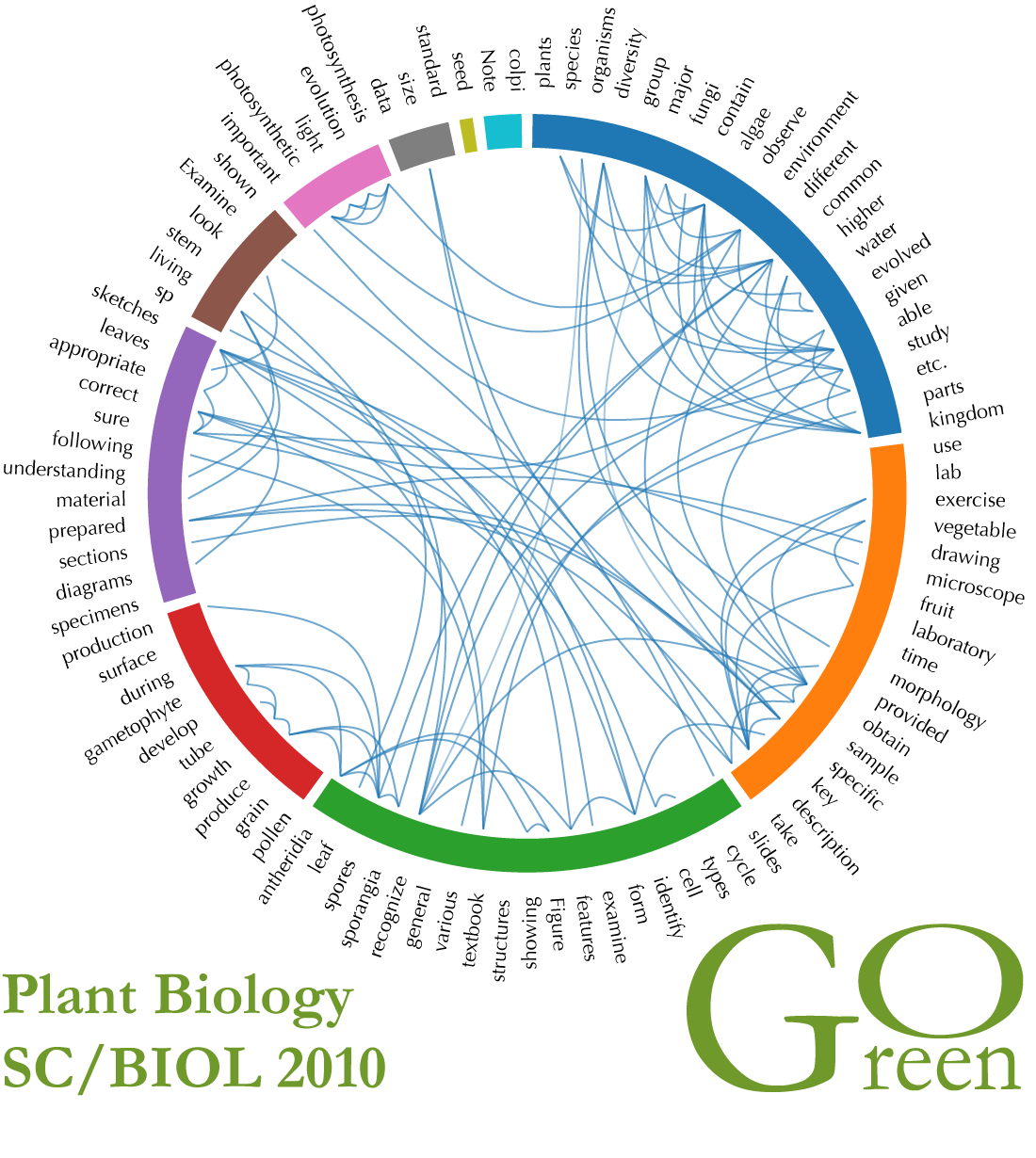
Course Information
Current advances in plant biology research, highlighting plant structure, physiology, development, and diversity. Three lecture hours, three laboratory hours. One term. Four credits.
Prerequisite
SC/BIOL1010 6.0 or SC/BIOL1000 3.0 and SC/BIOL1001 3.0 or permission of the Course Director.Course Director
Roger R. LewOther Information
Overview
This course is an introduction to the field of botany. Non-biology majors with some background in biology may enroll with permission of the Course Director. The lectures will present information about prokaryotes, algae, fungi and plants (structure, function, and diversity; lifecycles; ecology; relevance to human society). The laboratories are integrated with lecture, and illustrate the biological diversity of algae, fungi, and nonvascular and vascular plants, and highlight key aspects of plant biology.Organization of the Course.
The course involves formal lectures by the lecturer and weekly laboratories. The textbook and lectures are central to the course. Lectures serve to enrich, clarify, and illustrate crucial issues from the textbook used to reveal the diversity of photosynthetic organisms and --a major part of the course-- the life of a higher plant.The majority of the material presented in laboratory exercises focuses on developing the observational skills of the students: observation and recording of gross form and structure (including the life cycle of a fern), and microscopic form and structure. Opportunities to identify material using keys --from algae, conifers to pollen-- test and hone the student's observational skills. The lecture and laboratory components are integrated (and usually synchronized). The final grade of the student is compiled from the combination of lecture and laboratory.Course Learning Objectives.
Please note that a detailed syllabus of lecture material and past tests provide a highly detailed and practical presentation of the Learning Objectives.A Course Information Handout [pdf] is available.
From the annual in-class course evaluation, here is Advice to Prospective Students: [2012], [2013], [2014] and [2015].
Course Goals:
Brief list of specific learning objectives of the course

- critically examine the diversity of major organismal groups --their characteristics and life cycles
- understand the key evolutionary transitions from photosynthetic microorganisms (cyanobacteria) to protist eukaryotes (unicellular algae) to multicellular complexity (algae, fungi and land plants), and appreciate the remarkable depth and breadth of 4000 million years of evolution
- develop and hone the observational skills required to identify major organismal groupings
- develop the flexibility required to apply and integrate fundamental principles and mechanisms in the evolution of diverse organisms --both form and function
- Become familiar with the scientific language used to describe organismal diversity and the ecophysiological basis of the life cycle of a flowering plant
- develop their ability to independently analyze organismal diversity and the life of a higher plant
The following support these goals:
Text
Raven Biology of Plants (8th ed.) by Evert and Eichhorn. 2012. Freeman.
Note: If you have an older edition, it should be acceptable. Be aware that chapters/page numbers that may be provided in class and lab will refer to the 8th edition.
The textbook is an essential component of the course. It serves as a resource intended to help students prepare for class, and complements lectures. You will also find it very useful for the laboratory exercises.
Lectures
M,W,F - 9:30 AM- 10:20 AM LAS BThe lectures are designed to introduce students to the study of botany, the diversity of plants and organisms previously considered plants, and the ecological and economic importance of these organisms. Material is drawn from a number of sources, and will be provided on reserve in the library if appropriate. Students are encouraged to use the Table of Contents and Index in the textbook to identify relevant readings in support of lecture material.
Please be aware that lectures are a crucial component of the course.
The material covered in lectures is an excellent guide to material on which you will be tested.
Weekly Laboratories
Mon., Tues., Wed., Thurs.: 2:30 pm - 5:30 pm; Wed. and Thurs.: 6:30 pm - 9:30 pm, 118 LB (Lumbers Building room 118)The laboratories in BIOL 2010 include observational exercises and some experimental activities. These exercises have been designed to support lecture material and to allow students to gain experience in studying botanical specimens and communicate laboratory findings. Laboratory submissions include practical microscope use, drawings, and lab reports. You will need the laboratory manual, a dissecting kit and safety razor blades.
Examinations
In this course, there will be two term tests, lab write-ups and quizzes, and final examination. These will allow you to demonstrate not only your knowledge of facts, but your ability to apply and integrate your understanding of concepts. In the lab quizzes, you will be asked to identify organisms that you have encountered in the labs, use dichotomous keys and demonstrate understanding of key structural and physiological adaptations of these organisms.Mark Distribution
- Two Term Tests and Final Exam: 60% total
The lowest score will be weighted 15%, the mid-score will be weighted 20% and the highest score will be weighted 25% except in the event of an absence from a term test (see below)
- Laboratory: 40%
A detailed breakdown of the lab marks are available in the lab manual.
In the event of an absence from a term test, please provide a letter stating that you were absent,
and acknowledging that the weight of the missed term test (15%) will be added to the weight of the final
exam (which will be worth 40%). A form [pdf] is available.
It is not always possible to accommodate missed lab assignments or quizzes, in which case, the weight of the missed lab assignment/quiz will be added to the weight of the final exam (25% plus the weight of the missed lab material, the term tests will still be flexi-weighted: lowest 15%, highest 20%)
